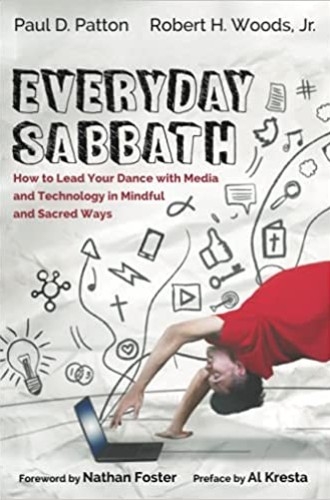In the dance with technology, who leads?
Jacques Ellul diagnosed the problem. Paul Patton and Robert Woods offer some solutions.
In 1954, Jacques Ellul published La Technique, the French Protestant intellectual’s groundbreaking work on the emerging technological world, a world he perceived as monolithic and inevitably totalistic. A decade later, the English translation appeared as The Technological Society. The book’s troubling and prescient takeaway is that technology is out of our control; in fact, it controls us. Resistance is futile. Having been enlightened to the problem of technological control, readers are left with a sense of powerlessness before the cold mercy of Technique, a dehumanizing idol that grows ever stronger and steadily coerces us toward its own ends, about which we are in the dark. Ellul doesn’t offer solutions to his disturbing conclusion—perhaps in part because he doesn’t discuss the distinguishing human quality of responsibility.
Thankfully, human responsibility toward technology is front and center in Everyday Sabbath. Paul Patton and Robert Woods have written an exceptional book that provides answers to the problem Ellul diagnoses. Using the metaphor of dance, they offer a biblically grounded musical score for learning how to lead when dancing with technology, social media, and pop culture.
Read our latest issue or browse back issues.
Patton and Woods are all about developing our God-given, albeit often neglected, responsibilities toward digital technologies. We have these useful technologies at our fingertips all day long. The authors see them as gifts from God. Yet they can easily gain control—not just occasionally but habitually. And when they do, our relationships with God, family, church, friends, school, work, and even play take a beating.
The authors contend that “the biblical notion of Sabbath is under a unique kind of assault in our digital culture” from a “24/7 flood of distractions” that “can drown out our capacity to rest in God’s presence.” The way ahead is to find sabbath rest amid the busyness of our digital culture by cultivating “holy habits” through what the authors call the Three Sacreds: “sacred intentionality, or a purposefulness toward God’s ultimate calling; sacred interiority, or an immediately accessible inner thought life and memory serving redemptive purposes; and sacred identity, or an understanding of who we are and who we are to become as people made in the image of God.”
The book’s nine chapters bring the Three Sacreds onstage to offer a wonderfully inviting panorama of insights and practical disciplines for creating—and maintaining—regular times of sabbath. To cultivate the Three Sacreds and “disentangle us from the dominance of spectator passivity,” each chapter includes fresh biblical exegesis relevant to life in our digital world. Conversation with sources from the past two millennia—Ignatius, Rumi, Calvin, Emily Dickinson, J. R. R. Tolkien, Abraham Joshua Heschel, Richard Rohr, and many others—also fills the pages. In addition, the book contains thoughtful breakout boxes, practical tips, and discussion questions designed to provide readers with new ideas and exercises for moving the dance with technology into more comfortable rhythms.
A feature I find particularly appealing is the authors’ clarity on the Jewish practice of Shema. Using the biblical Shema—“Hear, O Israel: The Lord our God is one, the Lord is one” (Deut. 6:4)—as an illustration, Patton and Woods encourage readers to adopt their own brief confessional prayer as a further means to develop godly rhythms for leading the dance. One’s prayer may be short or long. It includes scripture relevant to one’s dance (examples are offered), but it can also include truths from other relevant sources. It is memorized over time and “asserted explicitly every day” as a central confession.
Patton and Woods know their stuff. From assignments and discussions with students in their university classrooms over many years, these two scholars of communication and media discovered that most of their students were in varying degrees addicted to their phones and social media. Not a few even experienced withdrawal symptoms when they were given simple assignments that included going without those technologies for a mere 24 hours.
Concerned, the teachers began creating a curriculum that both affirms technology as a gift from God and teaches students how to identify problems and change their responses toward pop culture and social media to form wiser habits of engagement. Everyday Sabbath is the fruit of that labor in book form. The book’s interior has been laid out for easy use in classrooms for courses in pop culture, media and technology, and spiritual formation, but the book is not only for students. The authors write “for the ‘thinking Christian’ who wants to develop a biblically based, holistic way to respond to our digital culture’s worldview and grow Christ-like habits of the high-tech heart.”
Winsomely written, amply illustrated, and potentially life-changing, Everyday Sabbath is the kind of book you can’t go wrong with. Its insights, conversations, and practical exercises serve the authors’ purpose of helping move readers from being mere recipients of the book’s wisdom to becoming daily participants in leading a dance with the digital world for the glory of God.
It’s a dance, but it is also a battle, as Ellul identified all those years ago. We have a responsibility to become wiser stewards of our time so as not to allow Technique to rule our daily activities. “In a technological age,” the authors write, “Christians are called to be ‘resistance fighters’ who take part in worldview guerilla warfare and practice what Christian apologist and author C. S. Lewis describes as ‘resistance thinking’ in our daily involvement with media and technology.” In other words, resistance is not futile under God in Christ.






